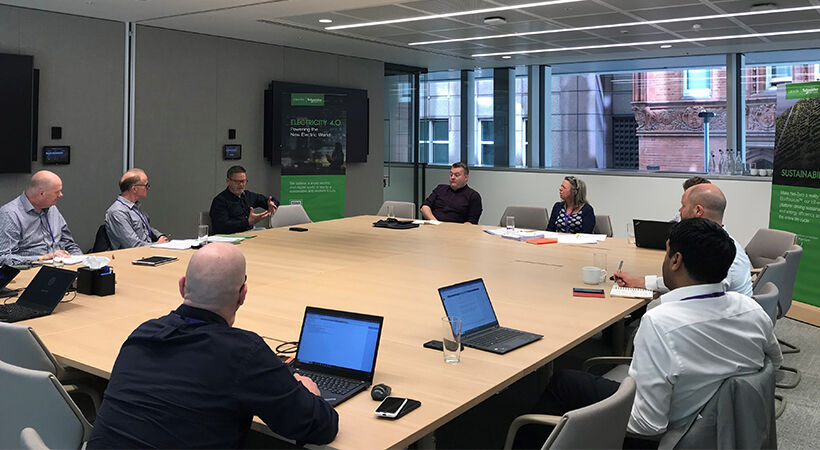In the latest Smart Buildings Magazine round table, hosted by Schneider Electric at 150 Holborn, the panel looked at sustainability and the impact that training will have on the smart building industry.
In attendance:
Jon Belfield, InTandem Systems
Kas Mohammed, Schneider Electric
Matt Wallace, Schneider Electric
Ciaran Vaughan, Schneider Electric
Jonathan Winston, The Carbon Trust
Scott Smith, Dar Group
Matthew Marson, JLLT
Wendy Belfield, BCIA Trailblazers
Sustainability is something that appears to be at the top of the agenda for some companies, but many are simply playing lip service to the concept.
But what is sustainability?
A simple definition is that sustainability consists of fulfilling the needs of current generations without compromising the needs of future generations, while ensuring a balance between economic growth, environmental care and social well-being.
At the latest Smart Buildings Magazine panel debate, which took place at The Dar Group’s new building at 150 Holborn, it was clear that whilst sustainability is a goal from whichever perspective you are looking at, the means to getting there are not clear at all.
Jon Belfield opened the debate, saying that collaboration is vital to succeed and Jonathan Winston backed this up by saying that it was important that sustainability is embedded in projects from the beginning, but it shouldn’t be about products it should be outcome based at the beginning. Matthew Marsden added that architects should be thinking about the things that can be done passively, such as looking for cross ventilation or making sure the building is oriented properly to protect facades. This should be done before adding comfort systems that use energy.
Scott Smith gave the example of 150 Holborn, where the needs of the building had changed significantly since the project had begun in 2015. We need to know how a building is performing in order to reach net zero targets in the future. Scott added that he felt that everything has to go electric in the coming years otherwise we won’t achieve any of our net zero goals. The aim of the building was to be BREEAM outstanding, which has been achieved, plus the building now has a flexible backbone which can be adapted when technology changes.
Wendy Belfield said that a lot of her clients want to get as energy efficient with the equipment that they currently have, but they have pressure from manufacturers trying to sell their kit as a solution, and the client does not have the budget to do this or the personnel to manage and install new equipment.
Ciaran Vaughn then turned the conversation to education and said that this was the long term solution. Wendy then commented that the government has a number of industry pathways, including occupational mapping for the built environment, but as it stands, sustainability is not in any of those. She added that we need to be educating people at T level stage and embedding it in the occupational map.
Kas Mohammed then added that sustainability needs to be normalised and not just a day in a course, it needs to be thought of as a natural part of any education. Jonathan Winston added that we need employers on board to make this happen.
Wendy also said that people taking T levels have to have a 45 day placement, which she says is fantastic for employers as they can work with younger people and show how good the building controls industry is and get them to stay in the industry after they qualify. Matt Wallace commented that we are low on skills in the industry, but Wendy believes that T levels will answer this problem and that industry should get behind them.
Finally, it was put to the group that the only way that sustainability could be achieved was if there was proper regulation and legislation in place. At present it seems that a lot of companies have ambitions in this direction, but have no compulsion to affect change. The current energy crisis may be a great leveller but as Ciaran commented it is a slightly depressing outlook at the moment and people need to be told what to do to affect change.
Jon summed up the discussion up by saying that although we are in a perfect storm for skills, with the demand growing and the supply being static or reducing, the corner has now been turned and both the BEMS Trailblazer and T-Levels will hopefully deliver the practical skills to start to unlock the potential in all buildings.





